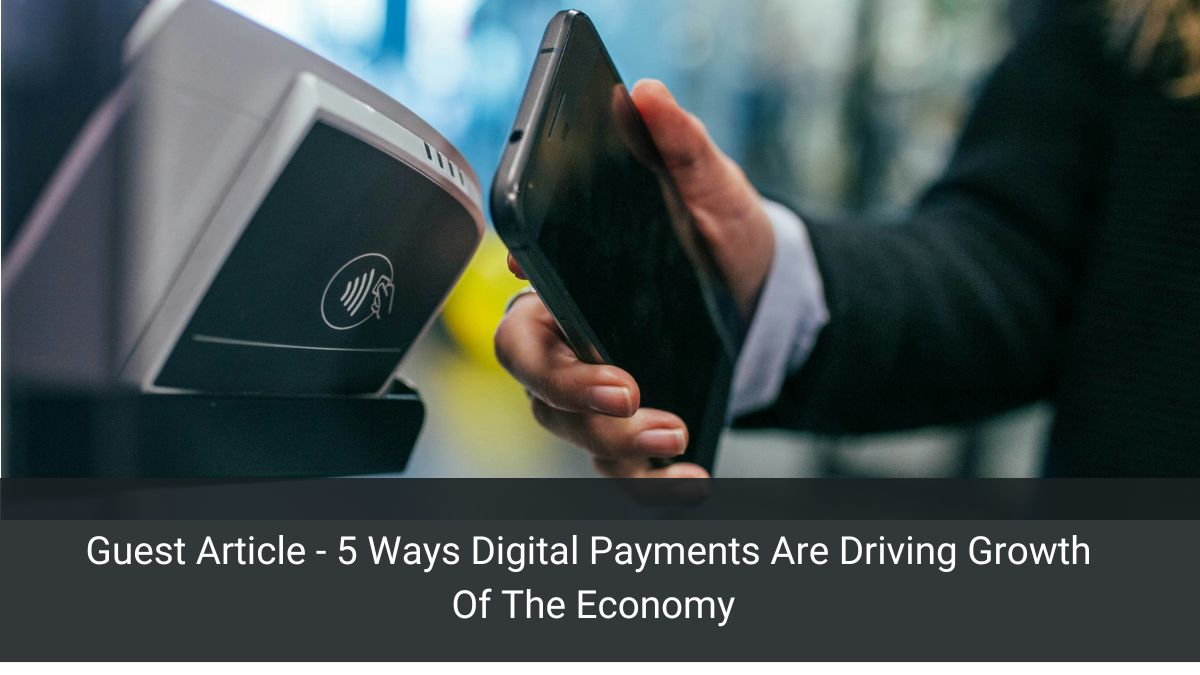Tech
5 Ways Digital Payments Are Driving Growth Of The Economy

When was the last time you made a digital payment? Chances are, it might have been earlier today. In today’s digital age, where digital transactions have integrated into our daily routines, India has emerged as a leader in this global digital transformation.
As per RBI Governor Shaktikanta Das, India accounts for 46% of all digital payments in the world. This remarkable surge in recent years has been fueled by a constant effort by the government to make India a cashless economy. Spearheading this are innovative payment platforms such as the UPI (Unified Payment Interface), Bharat Interface for Money (BHIM) app, net banking, etc. These platforms have garnered widespread acceptance among individuals and businesses alike, offering a seamless, convenient, and quick way of making payments.
This marks a significant milestone that showcases India’s prowess in digital payment technologies. In today’s article, let’s navigate through this growth and understand the impact on India’s economy.
India’s digital payments growth
With a population of 1.4 billion, India is emerging as a frontrunner in digital payments. The country saw a 90-fold increase in digital payments over the last 12 years (RBI)! This has been made possible by initiatives like Har Payment Digital, Jan Dhan Yojana, the Digital India campaign, and more. Moreover, the widespread adoption of platforms like BHIM-UPI, IMPS, PPIs, NACH, AePS, and NETC has improved the payment landscape, enabling seamless Person-to-Person (P2P) and Person-to-Merchant (P2M) transactions.
Impact on the economy
Recently, the External Affairs Minister highlighted India’s digital payment surge, revealing that the nation conducts Unified Payments Interface (UPI) transactions totaling ₹120 crores monthly in 2024. In contrast, the United States manages only ₹40 crores in digital transactions annually. This impressive performance firmly establishes UPI as the preferred mode of payment for millions nationwide.
Furthermore, during a recent interview, the Prime Minister lauded UPI as a hallmark of Indian innovation. He described it as a transformative instrument, breaking down barriers and democratizing access to digital transactions, even in remote regions.
Building upon the foundation of India’s digital payments growth, let’s explore the five ways how it’s positively impacting the economy:
- Financial inclusion: Digital payments serve as a gateway to financial inclusion, especially for underbanked and unbanked communities. These payment platforms boast user-friendly interfaces, empowering individuals and businesses alike to seamlessly participate in the digital economy. Through their secure and convenient solutions, digital payment platforms are not only facilitating economic growth but also fostering socioeconomic development on a broader scale.
- Support for small businesses and entrepreneurs: By embracing digital payment solutions, SMEs can overcome traditional barriers to entry and access a global customer base, thereby expanding market reach and stimulating economic activity. Flexible payment options and secure transaction processing enhance customer experiences, leading to increased sales and revenue for businesses. Moreover, digital payment platforms offer valuable tools and resources for financial management, enabling entrepreneurs to make data-driven decisions and allocate resources more efficiently. This improved financial management translates into higher profitability and sustainability for small businesses, which, in turn, fuels job creation and economic growth.
- Innovation and technological advancements: Fintech startups constantly pioneer cutting-edge payment solutions to cater to changing consumer demands. This includes innovations like contactless payments, biometric authentication, and blockchain-based currencies. By fostering a culture of innovation and collaboration, digital payments drive the growth of the digital economy and bring transformative changes in financial services, driving the industry forward.
- Increase in efficiency and productivity: In the digital era, streamlined financial transactions are crucial for business success. By automating various aspects of transaction processing, businesses can optimize their cash flow management, reducing the time and resources traditionally required for manual administrative tasks. This streamlined process not only enhances operational efficiency but also frees up valuable resources that can be redirected toward strategic initiatives and investments. Ultimately, these efficiency gains contribute to overall economic growth by improving the competitiveness and agility of businesses, fostering innovation, and driving productivity gains across industries.
- eCommerce growth: The rise of digital payments and eCommerce have changed the way customers shop globally. Secure payment gateways and seamless transactions have facilitated convenient and accessible shopping for consumers worldwide. With diverse payment options like credit/debit cards, digital wallets, and UPI, e-commerce businesses can offer frictionless checkout experiences. By embracing digital payment technologies, online retailers can drive sales, extend market reach, and contribute to the digital economy.
The power of digital payments
India’s journey from a cash-centric economy to envisioning a digital future makes it increasingly clear that digital payments represent more than just a mode of financial exchange. They signify a fundamental shift towards a more interconnected, streamlined, and inclusive economy, where individuals and businesses alike can seamlessly participate in economic activities.
With each digital transaction, individuals and communities are empowered to access financial services, expand market reach, and contribute to economic growth. As India continues to embrace digital payments and promote financial literacy and digital empowerment, the nation moves towards a future marked by innovation, empowerment, and prosperity.
(Written by Mr Satyajit Kanekar, Co-founder & CEO of Mobileware Technologies)

